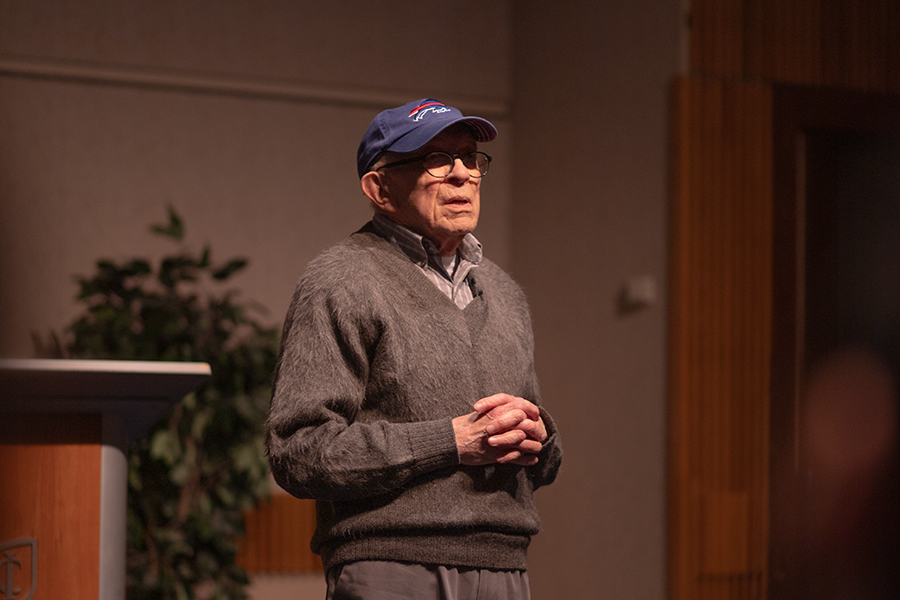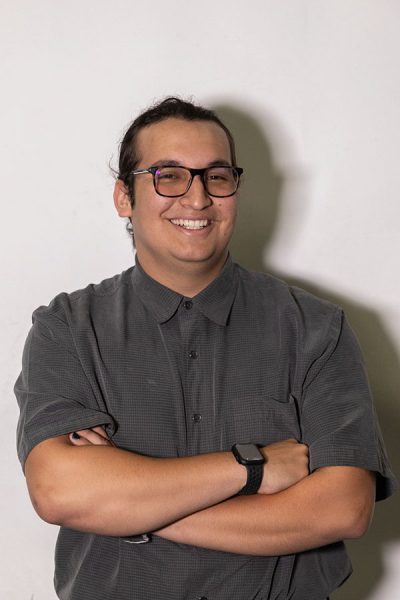In honor of International Holocaust Remembrance Day, students and guests gathered in Emerson Suites and heard from Jewish Holocaust survivor Samuel Rind on Feb. 1.
The Ithaca College Student Leadership Institute and Ithaca College Hillel brought in Rind to share his personal story in relation to the Holocaust. Rind, who visited and spoke to students at the college in 2017, is a regular speaker on college campuses and across the Western New York area.
Before the event, Rind had dinner with a small group of students that have personal connections to the Holocaust, whether they have grandparents or great-grandparents who are survivors. Khiya Connolly-Sisk, the Springboard Innovation Fellow at Hillel, said those interactions and Rind’s insistence to meet students were very impactful.
“The most significant part of the entire event was those personal connections that were formed,” Connolly-Sisk said.
As the event began, people gathered in Emerson suites. Over 200 people attended the event. There were so many attendees that many students gave up their seats to stand or sit on the floor.
Rind, who traveled from Rochester to speak to the community, was introduced by junior Nathan Zakim, an engagement intern with Ithaca College Hillel.
“Hearing stories of those who survived the Holocaust has been and will always be important to people from all walks of life, especially as survivors grow fewer in number,” Zakim said.
Rind was a very dynamic speaker; he opted not to use the mic, saying his loud voice was all that was necessary. Rind captivated the large audience with his story which was told mostly out of order. Rind would switch from telling of his time in the Holocaust to telling of his life and family after. His story was personal and organic. He described his time in the concentration camps and his eventual move from Poland to Bolivia to the United States, with his mother always by his side.
“We need it to survive somehow,” Rind said. “Survived, we did, unfortunately just my mom and I. Shortly but surely, one at a time my family disappeared, never came back. That meant they were killed.”
Rind is 86 years old but is still unwavering in his beliefs. Lauren Goldberg, the director of Hillel, said that despite some students being just three generations from the Holocaust and feeling like it’s still within their lifetime, there is a threshold where stories directly from the survivors won’t be heard anymore.
“As long as we can possibly do it, I will keep bringing new voices into the room,” Goldberg said. “A part of bearing witness is also like setting with our relationship with this story and walking out and truly feeling that humanity of every human.”
Many attendees of the event shared similar thoughts, stating that it is important to hear from these individuals as there are fewer first-hand accounts each year. Marc Weinberg, lecturer of Finance and International Business in the School of Business, said Rind’s story struck a chord with him.
“There are very few survivors who have this experience, and it’s important to hear that because it’s an important part of the world’s history and the history of this country,” Weinberg said.
Sophomore Cameron Stanford, who attended the event, said he appreciated hearing Rind’s story and thought it was very impactful.
“It is very refreshing to see someone just willing to share their experience and I know it takes a lot to come into a very large group of people and present that vulnerable story,” Stanford said.
As the event came to a close, students were encouraged to buy Rind’s book, “A Tribute To Mom, We Survived Together,” in which he tells his full story and honors his mother, who was the only other person in his family to survive.
“For all the s— I went through; my mother and I went through, I’m thankful and I’m happy,” Rind said.
Additionally, members of AEPi, the unaffiliated Jewish fraternity in Ithaca, set up a few tables promoting The Gift of Life, a public bone marrow and blood stem cell registry. Students and guests were encouraged to sign up and swab their mouths to then be connected to the registry if they were eligible to give bone marrow.
Connolly-Sisk said that she thought many students appreciated the opportunity to hear Rind’s story and that it was especially important to invite people from the local community. She said it is important for younger generations to hear stories from survivors of the Holocaust with the growth in fake news and an alarming rise in individuals who believe the Holocaust was not real.
“There’s a lot of different aspects to organizing an event like this both in cultivating the space, making sure that we advertise appropriately, reaching out to different community partners, whether that be the local temples in town or other organizations similar to that,” Connolly-Sisk said.
Goldberg said other times Rind has spoken, Holocaust deniers have gotten up and yelled that he was lying. She said it is important for all who attend events where Rind and other Holocaust survivors talk about their story to continue to spread their message.
“We can read history, and we can watch movies, and we can educate ourselves through books and documentaries, but I feel like there’s something that’s transmitted when you’re in a room with a survivor that you just can’t experience in the same way from just absorbing educationally in a one-sided kind of internalization,” Goldberg said. “When there are no survivors left, for us to be able to say that we heard these stories and we heard this directly from a survivor, I think that will be powerful.”










Dreama Spangler • Feb 8, 2024 at 3:12 pm
God bless this man and his stamina to tell his experience. It makes me sick that people don’t think that it happened. There’s a special situation, question waiting on them. Again, thank you Mr Rind, 0 God bless 🙏
Lerai Koppel Nichols • Feb 8, 2024 at 2:57 pm
I returned from Poland this week and am still processing what I saw.
I went to the JCC in Krakow and met with a 94 year old survivor who was in 5 camps. He lives part time in Krakow and part time in California.
He shared his thoughts and feelings and I walked away from that conversation with a heavy heart and more importantly, motivation to make sure young people learn about this part of history.